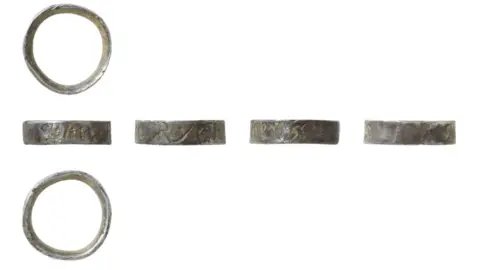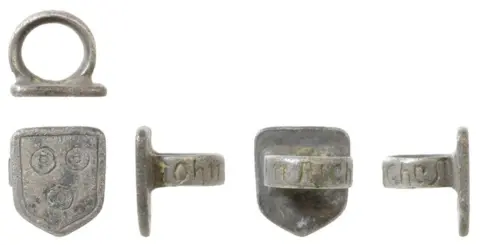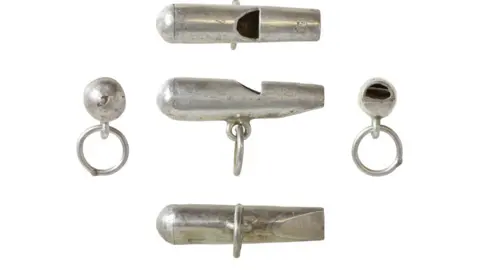Hawking rings inscribed with Swannington landowner's name found
 Andrew Williams/Norfolk County Council
Andrew Williams/Norfolk County CouncilTwo 17th Century silver hawking rings unearthed by metal detectorists have been linked to a Norfolk gentry family, research has revealed.
One was engraved with the name John Rychers and the second John Riches. They were found at Swannington, where the Richers family lived.
Historian Helen Geake said it was not unusual in this era for someone to "style their name in different ways".
The finds date to just before falconry "died out as a popular pursuit".
 Andrew Williams/Norfolk County Council
Andrew Williams/Norfolk County CouncilThe Richers lived at Swannington Hall from the 15th Century onwards and would have used the hawking rings, known as vervels, to identify ownership of the birds if they were found dead or flew off.
Dr Geake, who is the Norfolk finds liaison officer, said: "While the Richers aren't at the top echelons of society, hawking seems to have been an affordable way of showing off that you're part of the gentry."
A "tiny, tiny" 17th Century silver hawking whistle with a Norwich maker's mark has also been found by a detectorist at Hockering, about eight miles (13km) away.
Dr Geake said: "I can imagine the owner having it on a little chain attached to his outfit and then whistling in his hawk to get it back."
 Andrew Williams/Norfolk County Council
Andrew Williams/Norfolk County CouncilShe said the finds were evidence of how extensive aristocratic hawking was just before it "died out as a popular pursuit and the sport almost, but not quite, disappeared".
The massive increase in firearms during the English Civil Wars, between 1642 and 1651, helped bring about its end. It was much easier to shoot game for the kitchen than train a hawk for the purpose.
All three items, which were discovered in 2021 and 2022, have been declared treasure by a coroner and Norwich Castle Museum hopes to acquire them.

Find BBC News: East of England on Facebook, Instagram and Twitter. If you have a story suggestion email [email protected]
